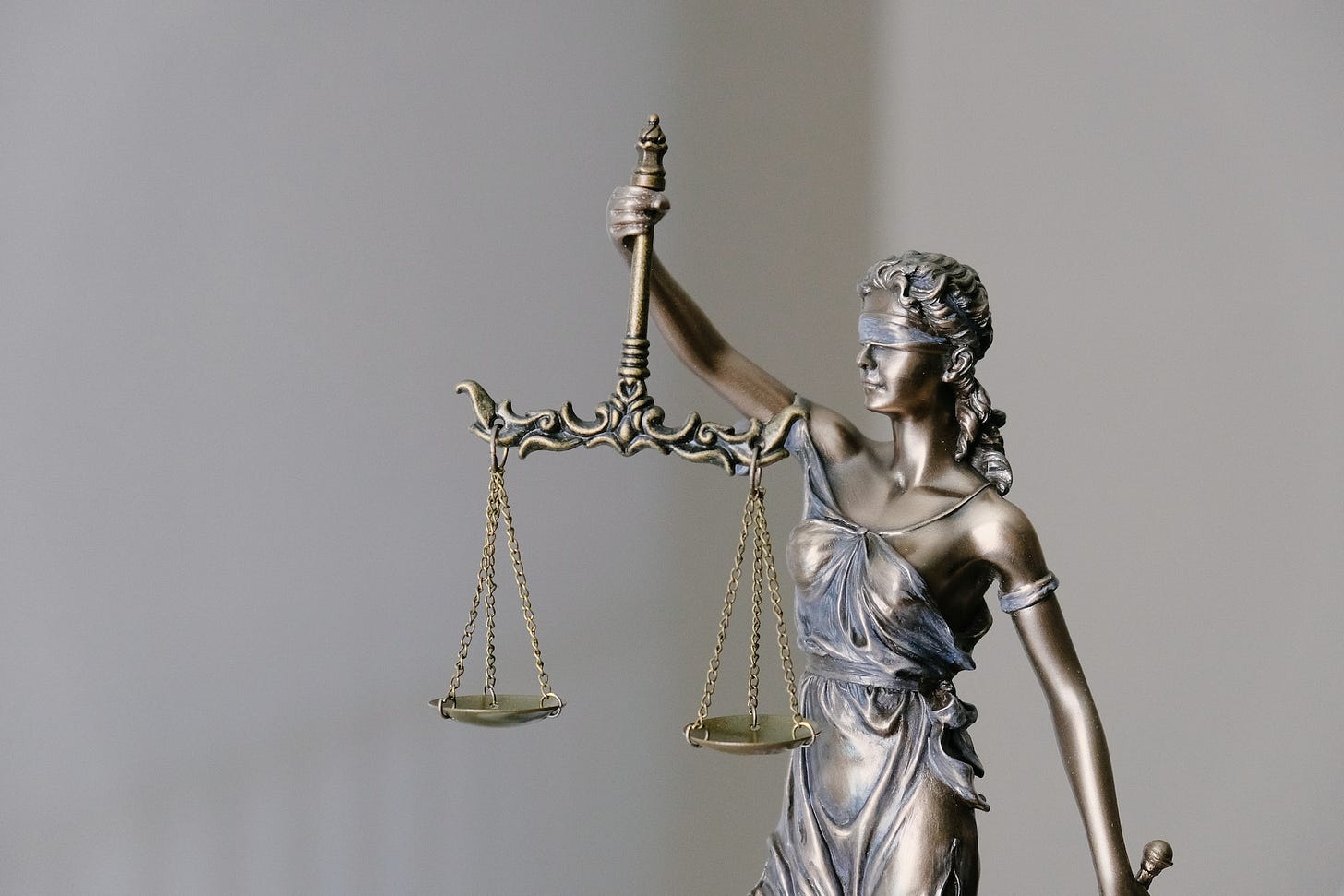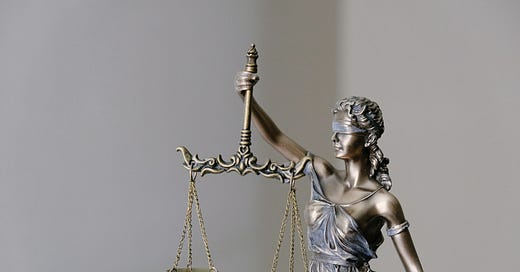Navigating a Whackadoodle World: Episode 21, or the Judicial Process sure is confusing.
The Power of Process and Growth: A Whackadoodle discussion with my student in which we attempt to make sense of the judicial process.
If you have entered this story in the middle, click here for the table of contents.

I have to admit that I started my lesson with her in a tirade. She had simply asked, “How do people get indicted?”
To which I answered, “I know of a lot of men, and women, who have been indicted, pleaded not guilty, but not been able afford bail. I even know some of them personally. All American citizens lose some of their rights when they get indicted. If they can’t afford bail, they sit in jail until their trial, when they can finally prove their innocence before a jury of twelve. Most Americans can’t go online and post veiled threats against their accusers without getting a giant contempt charge, and getting their big fannies thrown in jail. Talk about a two-tiered justice system!”
She returned me to my senses by simply reminding me, “I just want to know how people get indicted.”
“Sorry,” I said. “I think I got distracted. So, what do you already know about indictments?”
“I know that it’s when people go before a judge and have to plead guilty, or not guilty, to a crime they are accused of committing. It’s when their bail is set, and the trial dates are set.”
“Sort of, but not really,” I nodded. “An indictment is nothing more than a legal document that informs the public that someone has been accused of a crime and sets out the nature of the crime they are accused of doing. The Judicial System then takes over and sets a booking date and an arraignment date for them to appear. It’s at the booking that personal information is entered into the system, details of the case, fingerprints, mugshots, etcetera. It’s at the arraignment that legal counsel is confirmed, charges are read, rights are reviewed, bail is set, and so forth.”
“I didn’t realize they were different.”
“They are different, and both extremely important steps in the Judicial Process.”
“I should have known that you would bring up process and growth this week,” she complained.
“Of course, I’m going to bring it up. We’re in week seven, aren’t we? Or have I got my weeks mixed up?”
“No, you haven’t got them mixed up. I’ve just never thought about justice as a process.”
“Well, start considering it that way, because it’s in following that process that we all learn to stay honest and get along. Now, getting back to your original question. How do people get indicted? I suppose the whole process begins with someone committing a crime, or at least being accused of committing a crime.”
“Can an innocent person get indicted?” she interrupted.
“Of course, it happens all the time. That’s why in America we hold people innocent until proven guilty in a court of law. But we also have a number of steps in our judicial process that attempt to keep innocent people from being indicted.”
“Like what?”
“It kind of depends on where you live. Each state has its own judicial process. The federal government has a whole other process. But I suppose there are a few things they all have in common. All prosecutors have to bring evidence before the court in order to even get someone indicted. And in that court, the prosecutors have to prove by a preponderance of the evidence that it’s likely a crime was committed. Depending on where you live, and what kind of crime you’re accused of, that court may be a single judge, or it could be a grand jury.”
“And what’s the difference between a Grand Jury and a regular Jury?”
“A Grand Jury hears evidence on a bunch of different cases during their service. They are generally pulled from the same jury pool as trial jurors, but there are usually at least 24 people on Grand Juries. Their job is to determine whether or not the prosecutor has enough evidence to bring charges. They don’t have to decide beyond a reasonable doubt. They just have to determine by a simple majority what the preponderance of evidence shows. Ultimately, they vote to bring indictments. In places where there is no Grand Jury, Judges can do that same thing. Both are designed to work secretly. Got it so far?”
“Yeah, I got it, but why secretly? I thought the justice system tries to be transparent.”
“Once an indictment is unsealed, the process becomes more transparent. However, before it is determined in court that the prosecutor has enough evidence to proceed, everything is supposed to stay secret.”
“But why?”
“It’s part of the judicial process, and it’s done to protect the innocent. I mean, what if your dad was being investigated, and evidence against him was brought before a Grand Jury. Everybody hears your dad is under investigation. Goodness me; I wonder what he did. Then the Grand Jury decides not to indict because there is not enough evidence. Your dad’s reputation would be ruined, for no cause.”
“Yeah, I guess that makes sense.”
“Now to the second half of your question, ‘What is a petit jury?’”
“I didn’t ask about petit juries,” she informed me. “I’ve never even heard of them.”
“Petit jury, trial jury, or what you so charmingly called a regular jury, all refer to the same thing. Twelve people who listen to a single case and decide beyond any reasonable doubt that the crimes alleged are correct. In the end they decide guilty, or not guilty. If it’s a civil case, they can return judgement with a simple majority. In a criminal case, all twelve must agree.”
“And then the judge pronounces the sentence?”
“Yep. And if all has gone well, justice will have been served. Of course, there’s always the Appeals Process.” She looked at me darkly, so I added quickly, “Maybe we can cover that another day.”
She nodded, “So now that Trump has been arrested, I wonder how stuff will end.”
“No, no, no, Trump has not been arrested. He has been indicted in four precincts: Florida, Georgia, Washington DC, and New York City. He has been booked and arraigned. He has not been arrested.”
“I guess I’m still not clear on the difference.”
“Indictments inform a citizen that the judicial system intends to bring charges. They detail the nature of the charges. Then the Justice System sets a date for booking and arraignment. Trump won’t get arrested unless he fails to show up for his booking and arraignment.”
“What’s Booking again?”
“It’s when the details of each case get entered into a giant book that the authorities keep under their beds.”
“Be serious.”
“It’s when critical details of the case are entered into the system and issued a case number.” I listed them on my fingers. “The photo, fingerprints, and birthdate of the defendant; their weight and height,” I added with a snicker, thinking we might actually learn the truth. “In some cases, police and arrest reports.”
“What would happen if Trump didn’t show up?”
“The judge would issue a bench warrant, authorizing his arrest for contempt of court. Arrest is when officers book you and stick you in lockup until your arraignment can be scheduled.”
“You really think the judge would do that?”
“Only if he doesn’t show up, and only it we have equal justice for all. In the end, I predict he’ll show up. He’s not going to want to risk it.”
She started packing up her books, while adding, “The Judicial Process is certainly confusing.”
“Would a PDF help?” I asked, reaching for my iPad to search for the page I wanted. “Here you go,” I added, and passed her what I had found. “It’s a link to a PDF breakdown of the process. You can check it out later, once you are home, but remember this PDF is about Eire’s judicial process. Your district is likely to have some differences.”
“Thanks,” she said, writing down the URL. “I’m sure I’ll have questions next time.”
“That’s why I’m here,” I grinned. “To help you in the Learning Process.”
She groaned and slung her backpack over one shoulder. “See you next week.” And with that she headed out the door.



